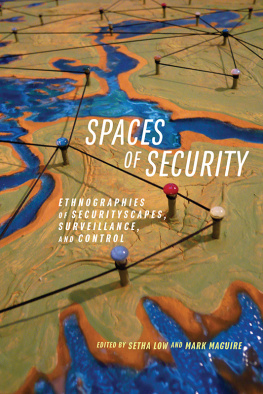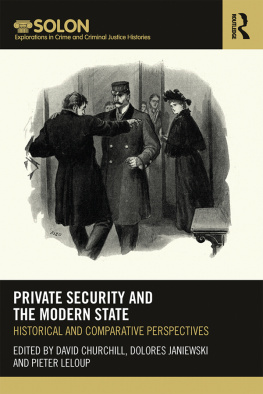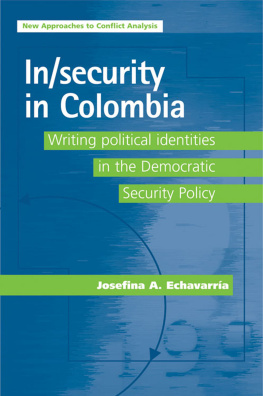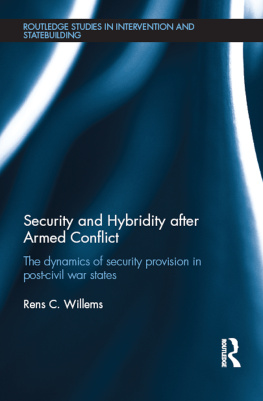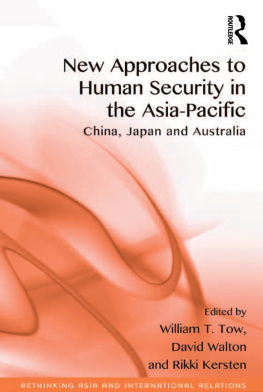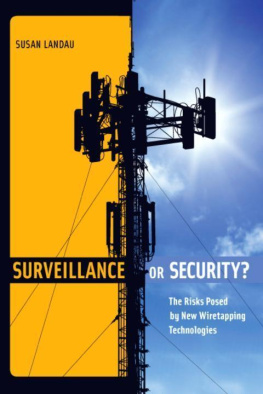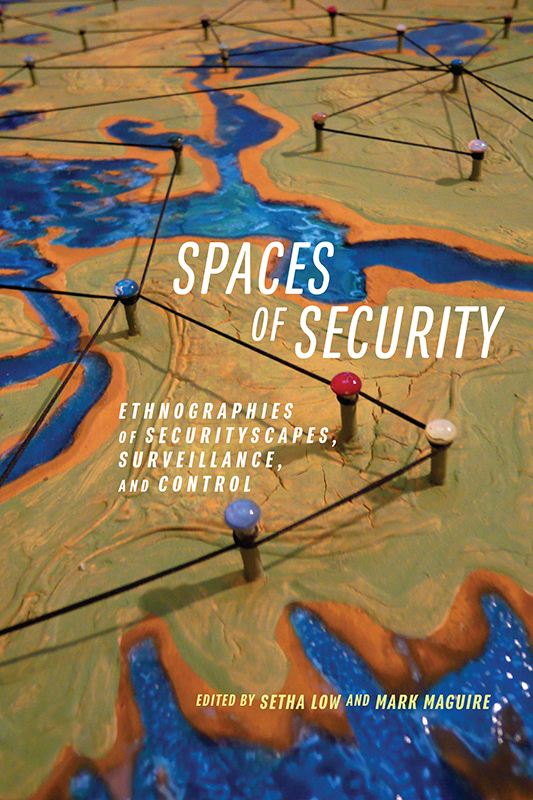
Spaces of Security
Spaces of Security
Ethnographies of Securityscapes, Surveillance, and Control
Edited by Setha Low and Mark Maguire

NEW YORK UNIVERSITY PRESS
New York
NEW YORK UNIVERSITY PRESS
New York
www.nyupress.org
2019 by New York University
All rights reserved
References to Internet websites (URLs) were accurate at the time of writing. Neither the author nor New York University Press is responsible for URLs that may have expired or changed since the manuscript was prepared.
Chapter 1 was previously published as Security Urbanism and the Counterterror State in Kenya by Zoltn Glck in Anthropological Theory 13(3) pp. 297321. Reprinted with permission.
Library of Congress Cataloging-in-Publication Data
Names: Low, Setha M., editor. | Maguire, Mark, editor.
Title: Spaces of security : ethnographies of securityscapes, surveillance, and control / edited by Setha Low and Mark Maguire.
Description: New York : New York University Press, 2019. | Includes ibliographical references and index.
Identifiers: LCCN 2018020936| ISBN 9781479863013 (cl : alk. paper) | ISBN 9781479870066 (pb : alk. paper)
Subjects: LCSH: Internal securitySocial aspectsCase studies. | Security sectorSocial aspectsCase studies.
Classification: LCC HV6419 .S72 2019 | DDC 363.32dc23
LC record available at https://lccn.loc.gov/2018020936
New York University Press books are printed on acid-free paper, and their binding materials are chosen for strength and durability. We strive to use environmentally responsible suppliers and materials to the greatest extent possible in publishing our books.
Manufactured in the United States of America
10 9 8 7 6 5 4 3 2 1
Also available as an ebook
To our children and grandchildrenMax, Sky, and abhafor a better future
Contents
Mark Maguire and Setha Low
Zoltn Glck
Katherine Verdery
Alejandro Grimson and Brgida Renoldi
Carmen Rial
Thomas G. Kirsch
Setha Low
Nurit Bird-David and Matan Shapiro
Catherine Lutz
Stephen Graham
Ursula Rao
Exploring Spaces of Security
Mark Maguire and Setha Low
This volume represents the efforts of anthropologists and others to explore spaces of security. Today, security is one of the most prominent topics in anthropology. A growing ethnographic literature explores its various dimensions, from studies of military action and everyday violence to research on specific infrastructures (e.g., Lutz 2002; Low 2003; Masco 2006). Some anthropologists are also exploring contemporary problematization of security by attending to new assemblages and sites of experimentation (e.g., Lakoff and Collier 2009; Maguire and Fussey 2016). Of course, the breadth of this ethnographic literature presents its own challenge. This volume arose from the simple observation that spatial metaphors and images saturate ethnographic research on security, and many of the theoretical devices usedassemblage, infrastructure, network, for exampleare thoroughly spatial. Yet, anthropology has not developed a coherent approach to this important dimension of security.
This volume draws together ethnographic research on spaces of security from different regions and scales (see also Glck and Low 2017). The examples discussed range from blast-proof bedrooms in Israel to biometric identification in India, and from border control in Argentina to counterterrorism in East Africa. Each contribution focuses on specific spatio-temporal configurations, infrastructural interventions, and shifts in discourse and practice. The different emphasis in each contribution shows the multiplicity of ways that one might grapple with the rascal concept of security. That said, our ethnographic research also demonstrates the power of a spatial lens to bring into focus the ways that security acquires its discursive content and concrete form.
Our effort to explore how security is worked out in specific ethnographic examples is certainly an antidote to grand claims about our age of security (see Gros 2012, 2014). Today, some scholars grant securitization excessive power as an all-encompassing process. Filippa Lentzos and Nikolas Rose even wonder if it is supplanting liberal democracy:
[B]order controls, regimes of surveillance and monitoring, novel forms of individuation and identification, notably those based on biometrics, preventive detention or exclusion of those thought to pose significant risks, massive investment in the security apparatus and much more. Have the political rationalities of advanced liberal democracies been displaced by new rationalities and technologies of government animated by the telos of security? (Lentzos and Rose 2009, 233)
Here, we avoid grand theories and provide several examples that decenter the Western sociological imagination (in this volume see Verdery, and Grimson and Renoldi). This raises a key question: if one cannot gloss security as the latest iteration of late liberal governing, what exactly are we dealing with?
There is an understandable temptation to retreat to the library and return with a comforting definition. Indeed, Holbraad and Pedersen (2014) propose that the varieties of security are understandable as the reproduction of collectives.
In 1983, Barry Buzan published the hugely influential People, States & Fear, a book that anticipates the end of the Cold War and promotes a new field of scholarly activity. He tracks a concept of security that has left the politico-military domain and becomes a mobile idiom for everything from the economy to the very nature of society. How does he define such an expansive concept? Buzan deliberately avoids hasty and superficial definitions when faced with a reality in flux. Instead, he draws from W. B. Gallies (1956) philosophical paper on essentially contested
In later writing, Buzan attempted to put shape on his field by looking to the limits of security, only to realize that its object-referent is human life itself:
The bottom line of security is survival, but it also reasonably includes a substantial range of concerns about the conditions of existence. Quite where this range of concerns ceases to merit the urgency of the security label (which identifies threats as significant enough to warrant emergency action and exceptional measures including the use of force) and becomes part of everyday uncertainties of life is one of the difficulties of the concept. (Buzan 1991, 432433; cf. Foucault 2007)
Here a threat might be anything deemed as sucheven change is potentially menacingwhile security is the concept that renders life itself a matter of life and death.
Buzans core position resonates with earlier concept work by Michel Foucault (2007)which we will discuss below in some detailby situating the problematization of security within the broader governance of population and indeed life itself. This is by no means a relativist position, because the key question is this: what are the precise conditions for the possibility of particular historical and spatio-temporal configurations of security, within and beyond liberal democracies? This question motivated our anthropological exploration of spaces of security, and we set out to find diverse ethnographic research that might help us think through this topic.
This volume arose out of scholarly conversations at conferences around the world but, most especially, at a Wenner Gren Foundation workshop in Ireland. Many participants discussed security as a set of discourses and practices that arrived in their ethnographic field sites from elsewhere, often as a ready-made package of solutions and mobile exemplars available to respond to some real or imagined crisis. Indeed, many recalled critical events (see Das 1995) after which security somehow became the normalized approach to complex societal problems. Others spoke of security as something already present in field sites that went by a different name, safety or peace, for example, or as a set of discourses and practices that simply do not follow the trajectory implicit in Euro-American sociology. Still others documented it as something extant and operating recursively through demands for ever-increasing security.
Next page
